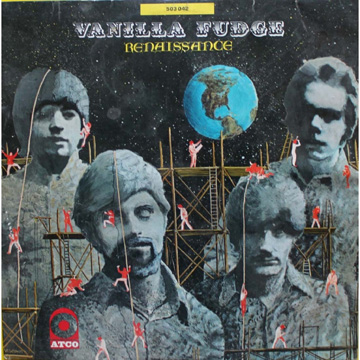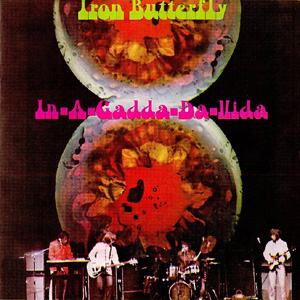
BY HASAN MURAT SÜMER (EE/IV)
hasan.sumer@ug.bilkent.edu.tr
I’ve been listening to reggae a lot lately; it hasn’t taken long for it to become my second-favorite genre. Still, I don’t feel confident enough to write about it just yet, so here’s some more psychedelia.
Some musicians are significant in that they played major roles during the very late 60s when progressive rock and heavy metal were evolving from psychedelic rock. Iron Butterfly was the closest thing to metal you could get in 1968, and Vanilla Fudge is known as having been a serious inspiration for bands like Led Zeppelin, Deep Purple and Yes. Let’s focus on those two this week.
You know something is familiar to half of the world’s population when it’s used multiple times for jokes in “The Simpsons.” Iron Butterfly is best, and mostly, known  for the 1968 album/song “In-A-Gadda-Da-Vida” (slurred pronounciation of “In the Garden of Eden,” apparently). The famous title track, which exceeds 17 minutes, is the reason why I’m writing this column; among all the songs I’ve encountered, it’s the one most representative of “acid rock.” Acid rock is a special genre, because musicians being very good at their instruments is not really an important requirement for producing the best of it (I’m not saying these guys aren’t talented, but they’re not virtuosos either). You’ve got to have a memorable guitar riff that’s not too fast and not too complex; it doesn’t matter if it’s extremely similar to the riff in “Sunshine of Your Love” by Cream. Then you need a dominant Hammond organ that harmonizes well with that distorted guitar riff. If you have them both, you can just introduce your song with some simple lyrics, and then perform a hard jamming session, accompanied by eerie sound effects, for 10 minutes. That doesn’t give you the best song in the world, but it perfectly fulfills the genre’s purposes, and also describes the song “In-A-Gadda-Da-Vida.” The much shorter, proggy “Are You Happy?” from the same album is actually a better song with better musicianship, but it lacks the epicness and psychedelia “In-A-Gadda-Da-Vida” offers. But what if they dropped the acid element and shifted their music to blues-oriented psychedelic rock? The 1970 album “Metamorphosis” shows that Sir I. Ron Butterfly could still deliver.
for the 1968 album/song “In-A-Gadda-Da-Vida” (slurred pronounciation of “In the Garden of Eden,” apparently). The famous title track, which exceeds 17 minutes, is the reason why I’m writing this column; among all the songs I’ve encountered, it’s the one most representative of “acid rock.” Acid rock is a special genre, because musicians being very good at their instruments is not really an important requirement for producing the best of it (I’m not saying these guys aren’t talented, but they’re not virtuosos either). You’ve got to have a memorable guitar riff that’s not too fast and not too complex; it doesn’t matter if it’s extremely similar to the riff in “Sunshine of Your Love” by Cream. Then you need a dominant Hammond organ that harmonizes well with that distorted guitar riff. If you have them both, you can just introduce your song with some simple lyrics, and then perform a hard jamming session, accompanied by eerie sound effects, for 10 minutes. That doesn’t give you the best song in the world, but it perfectly fulfills the genre’s purposes, and also describes the song “In-A-Gadda-Da-Vida.” The much shorter, proggy “Are You Happy?” from the same album is actually a better song with better musicianship, but it lacks the epicness and psychedelia “In-A-Gadda-Da-Vida” offers. But what if they dropped the acid element and shifted their music to blues-oriented psychedelic rock? The 1970 album “Metamorphosis” shows that Sir I. Ron Butterfly could still deliver.
 Vanilla Fudge’s self-titled debut album taught me that there is no limit to human imagination when it comes to covering someone else’s song. These guys took the Beatles’ short, sad “Eleanor Rigby” and turned it into an eight-minute-long, psychedelia-drenched, experimental track whose ending can give you goose bumps. However, their mostly self-composed album “Renaissance” (1968) probably had the most impact on the progression of music. In “Renaissance,” you can see that psychedelic rock is giving birth to heavy metal/hard rock and prog as non-identical twins. “The Sky Cried – When I Was a Boy” opens the album with a very aggressive electric guitar, very delicious Hammond organ, very good vocalization of lyrics, and a strong emotional load. For biological reasons, emotional load and psychedelia are not compatible ingredients of music, but Fudge impressively pulled it off anyway. Moreover, the emotional load persists throughout the album, along with the delicious organ. “Faceless People” is the track where the guitar truly shines; it’s a must-listen for every guitar fetishist out there. The cover song “Season of the Witch” is the longest track on the album and is mostly a vocalized poem-ish something or other, with excellent musical moments, and I can’t believe how much greater it sounds than
Vanilla Fudge’s self-titled debut album taught me that there is no limit to human imagination when it comes to covering someone else’s song. These guys took the Beatles’ short, sad “Eleanor Rigby” and turned it into an eight-minute-long, psychedelia-drenched, experimental track whose ending can give you goose bumps. However, their mostly self-composed album “Renaissance” (1968) probably had the most impact on the progression of music. In “Renaissance,” you can see that psychedelic rock is giving birth to heavy metal/hard rock and prog as non-identical twins. “The Sky Cried – When I Was a Boy” opens the album with a very aggressive electric guitar, very delicious Hammond organ, very good vocalization of lyrics, and a strong emotional load. For biological reasons, emotional load and psychedelia are not compatible ingredients of music, but Fudge impressively pulled it off anyway. Moreover, the emotional load persists throughout the album, along with the delicious organ. “Faceless People” is the track where the guitar truly shines; it’s a must-listen for every guitar fetishist out there. The cover song “Season of the Witch” is the longest track on the album and is mostly a vocalized poem-ish something or other, with excellent musical moments, and I can’t believe how much greater it sounds than  the original. “Renaissance” may not be the best set of songs on the planet, but its style is so original and flawless in every way, it rightly deserves a unique place in the history of music.
the original. “Renaissance” may not be the best set of songs on the planet, but its style is so original and flawless in every way, it rightly deserves a unique place in the history of music.
Since I’ve talked about good covers, I would here irrelevantly recommend Yes’s non-psychedelic cover (note that this cover originally ran for 10 minutes; there’s also a shortened version) of the Simon and Garfunkel song “America.” It’s simultaneously ridiculous, hilarious and awesome how they morphed this beautiful folk song into a prog masterpiece like that. It’ll make one react with the phrase, “Fudge YES.”
